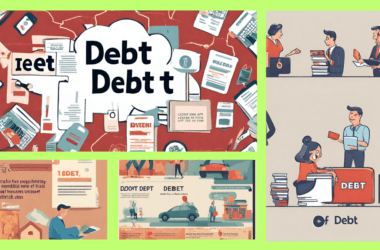Introduction
Debt consolidation is a financial strategy that many individuals consider when faced with multiple debts. It involves combining various loans into a single, more manageable payment. In this article, we’ll explore the pros and cons of debt consolidation to help you make informed decisions about your financial well-being.
Pros of Debt Consolidation
Single Monthly Payment
One of the primary benefits of debt consolidation is the simplicity it brings to your financial life. Instead of juggling multiple due dates and payments, you have one single monthly payment. This can reduce the stress of managing numerous bills and help you stay organized.
Lower Interest Rates
Debt consolidation often comes with the advantage of lower interest rates. By consolidating high-interest debts into a single loan with a more favorable rate, you can potentially save money in the long run. This is particularly beneficial for individuals with credit card debts.
Simplified Debt Management
Managing multiple debts means dealing with different creditors, terms, and conditions. With debt consolidation, you streamline the process. This can lead to a more straightforward and efficient debt management strategy.
Cons of Debt Consolidation
Potential for Higher Total Interest Paid
While the interest rates may be lower, the overall interest paid can be higher if the repayment period is extended. It’s crucial to carefully assess the total cost of the consolidated loan over its lifetime to ensure it’s a financially sound decision.
Extended Repayment Period
Debt consolidation often means stretching out the repayment period, reducing the monthly payment but potentially increasing the total amount paid over time. Individuals should weigh the benefits of lower monthly payments against the extended commitment.
Impact on Credit Score
Consolidating debts may temporarily impact your credit score, especially if you close existing credit accounts. It’s essential to be aware of the potential short-term effects on your credit while considering the long-term benefits.
Types of Debt Consolidation
Personal Loans
Personal loans are a common way to consolidate various debts into a single payment. They offer fixed interest rates and predictable monthly payments.
Balance Transfer Credit Cards
For credit card debts, balance transfer cards can be a viable option. These cards often come with introductory 0% APR periods, allowing you to pay off the consolidated balance without accruing additional interest.
Home Equity Loans
Homeowners may consider using the equity in their homes to secure a loan for debt consolidation. While this option may offer lower interest rates, it puts your home at risk if you can’t meet the payments.
How to Choose the Right Debt Consolidation Option
Assessing Financial Situation
Before choosing a debt consolidation method, assess your financial situation. Understand your income, expenses, and the total amount of debt you need to consolidate.
Comparing Interest Rates
Compare the interest rates of potential consolidation options. Ensure that the new rate is lower than the average rate of your existing debts to make the process financially beneficial.
Considering Repayment Terms
Examine the repayment terms of the consolidation option. Be aware of the monthly payment amount, the total repayment period, and any potential penalties for early repayment.
Alternatives to Debt Consolidation
Debt Settlement
Debt settlement involves negotiating with creditors to settle debts for less than the total amount owed. While it can negatively impact your credit, it provides an alternative for those struggling with repayment.
Credit Counseling
Credit counseling agencies offer assistance in managing debts. They can provide advice, budgeting assistance, and debt management plans tailored to your financial situation.
DIY Debt Repayment Strategies
Some individuals prefer a do-it-yourself approach to debt repayment. This may involve prioritizing high-interest debts, creating a budget, and aggressively paying down balances.
Success Stories: Real-life Experiences with Debt Consolidation
Case Study 1: Overcoming Credit Card Debt
John, a credit cardholder drowning in high-interest debt, opted for debt consolidation. By consolidating his credit card balances into a personal loan with a lower interest rate, John was able to pay off his debts more efficiently and improve his financial situation.
Case Study 2: Streamlining Multiple Loans
Sarah had various loans with different repayment schedules. She chose debt consolidation to simplify her financial life. By combining her loans into a single monthly payment, Sarah found it easier to manage her finances and avoid missed payments.
Common Myths About Debt Consolidation
Myth 1: Debt Consolidation Ruins Credit
While there may be a temporary impact on credit scores, responsible debt consolidation can ultimately improve credit by simplifying payments and reducing overall debt.
Myth 2: It’s a Quick Fix for Financial Issues
Debt consolidation is not a quick fix. It requires careful consideration and financial discipline to ensure long-term success.
Myth 3: Only for Those in Extreme Debt
Debt consolidation is suitable for various debt levels, not just extreme cases. It can benefit individuals with multiple debts seeking a more manageable repayment plan.
Tips for Successful Debt Consolidation
Create a Realistic Budget
Develop a realistic budget that includes your consolidated payment. This will help you manage your finances effectively and avoid accumulating new debt.
Avoid Accumulating New Debt
To maximize the benefits of debt consolidation, refrain from accumulating new debts. Focus on paying down existing balances to achieve financial freedom.
Seek Professional Financial Advice
Consider consulting with a financial advisor to ensure you choose the most suitable debt consolidation option for your unique situation. Their expertise can guide you towards a more informed decision.
Conclusion
In weighing the pros and cons of debt consolidation, individuals must carefully consider their financial goals, current situation, and long-term objectives. While debt consolidation offers advantages like simplified payments and potentially lower interest rates, it’s essential to be aware of the potential drawbacks, such as extended repayment periods. Making informed decisions based on individual circumstances is crucial for a successful debt consolidation journey.
FAQs
Q: How does debt consolidation affect my credit score?
A: Debt consolidation may have a temporary impact on your credit score, but responsible management can lead to long-term improvement.
Q: Can I consolidate student loans with other debts?
A: Yes, student loans can be consolidated with other debts through various consolidation options.
Q: Is debt consolidation a good option for small debts?
A: Debt consolidation is not limited to large debts and can be beneficial for managing smaller debts as well.
Q: What happens if I miss a payment during debt consolidation?
A: Missing payments during debt consolidation can have negative consequences, including potential damage to your credit score. It’s crucial to stay on track with your consolidated payments.
Q: How long does it take to see the benefits of debt consolidation?
A: The timeline for experiencing the benefits of debt consolidation varies, but individuals often notice positive changes within a few months of starting the process.

